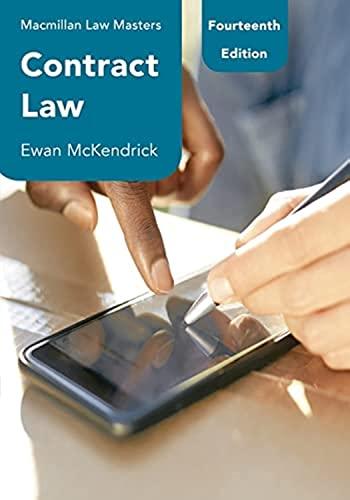Question
Detective Miller was investigating a robbery and went to the home of suspect Smith. Smith was not home but his mother was. Det. Miller asked
Detective Miller was investigating a robbery and went to the home of suspect Smith. Smith was not home but his mother was. Det. Miller asked her to have Smith contact him and provided his business card. Smith called Det. Miller the next morning and agreed to come to the police station. He drove himself there. Det. Miller took Smith into an interview room and the two started to speak around 9:40 a.m. The conversation in that room lasted until 12:15 p.m. At no time during the interview or outside did Det. Miller advise Smith of his Miranda rights. He started to on three occasions but was interrupted by Smith asking if he was being arrested. Smith was not arrested during the taped interview session. Det. Miller did state several times, and left no doubt, that Smith would be arrested. During the interview, Det. Miller made it clear he wanted Smith to confess to him "now and not later." The reasons, he repeatedly stated, were that if Smith "cooperated," Det. Miller informs the magistrate of setting bail and the prosecutor of that cooperation. Det. Miller also described unfavorable consequences that would follow from not cooperating at the moment and delaying his arrest. These consequences included a high bail amount and a longer sentence. In short, as their discussion continued, Det. Miller made it clear that to obtain favorable treatment, Smith had to make his statement before he left the police station. After this discussion, Smith confessed to the robbery. Despite earlier stating unequivocally that Smith would be arrested, Det. Miller let Smith leave the police station after concluding their interview.
What level of suspicion did Detective Miller need to speak to Smith on the telephone, and did he have that level of suspicion? What level of suspicion did Det. Miller need to visit Smith at his home and ask him to come to the police station, and did he have that level of suspicion? If Smith moves to suppress his confession, should the court grant that motion? Was Detective Miller required to read the Miranda warnings to Smith? Why or why not?
Step by Step Solution
There are 3 Steps involved in it
Step: 1

Get Instant Access to Expert-Tailored Solutions
See step-by-step solutions with expert insights and AI powered tools for academic success
Step: 2

Step: 3

Ace Your Homework with AI
Get the answers you need in no time with our AI-driven, step-by-step assistance
Get Started


